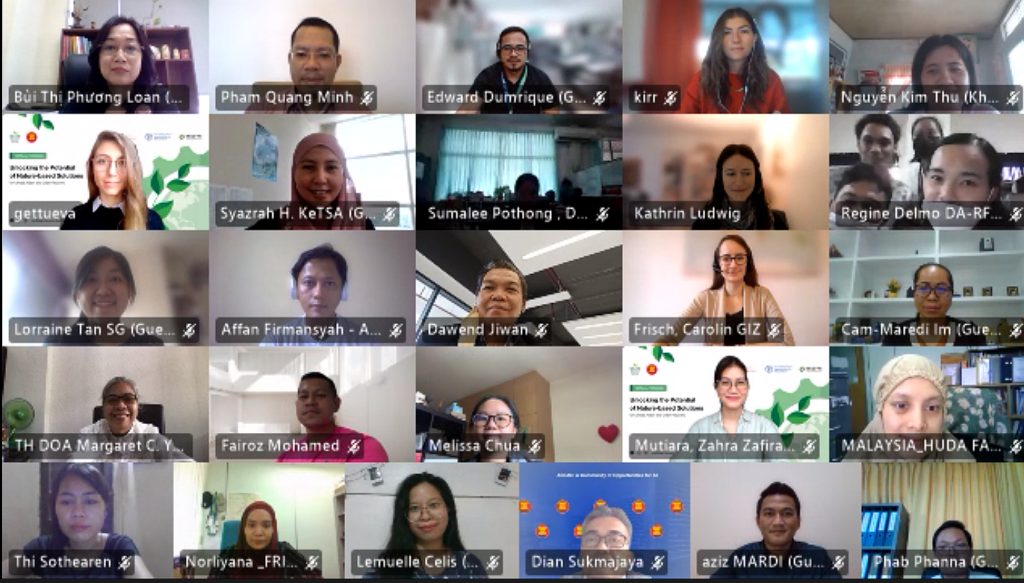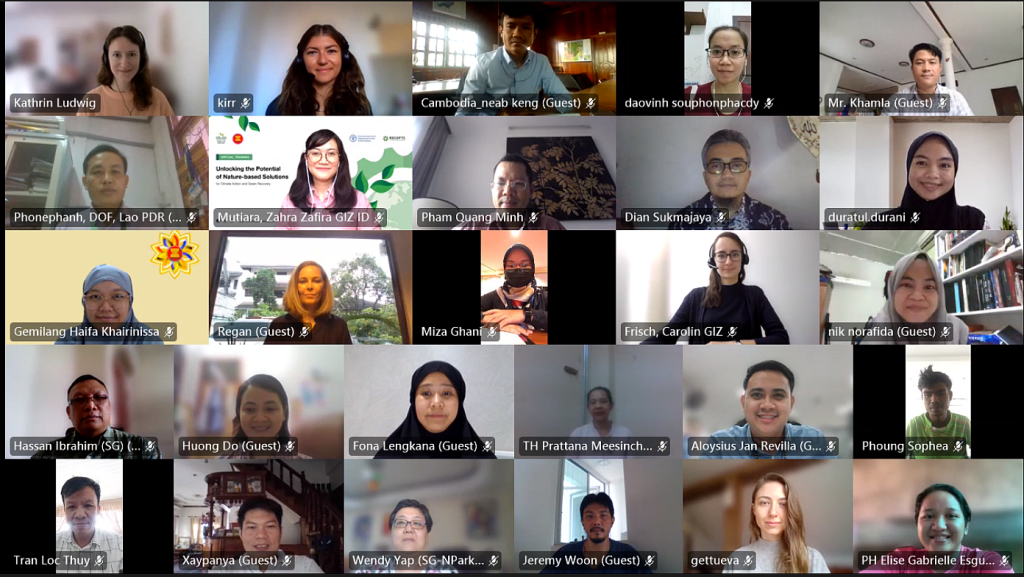
The topic of Nature-based Solutions (NbS) has attracted growing attention and is often discussed in the international community. NbS are considered to be a promising way of tackling socio-environmental challenges such as climate change, food security, human health and biodiversity loss.
To build capacity and knowledge exchange on NbS in the South-East Asia region, representatives of the Association of Southeast Asian Nations, or ASEAN, Member States (AMS) working in forestry and agriculture came together to participate in two three-day sessions of Virtual Training on Unlocking the Potential of Nature-based Solutions for Climate Action and Green Recovery.
The training was hosted by the ASEAN Secretariat and offered as part of the ASEAN Climate Resilience Network (CRN) activities. It covered the key aspects of NbS, including its mainstreaming, financing and governing, as well as its potential in the international arena. The training was run in two sessions, the first in the middle of September and the second in early October 2021. It brought together 57 participants working in agriculture and forestry from a total of 10 AMS.
NbS framework
In his opening remarks, Dr Pham Quang Minh, Assistant Director for the Food, Agriculture and Forestry Division of the ASEAN Secretariat, highlighted the importance of NbS for the ASEAN region. He welcomed this opportunity to stimulate discourse and enhance the participants’ understanding of the concept. Over the next three days, the participants shaped their understanding of NbS by delving into key principles, concrete examples as well as challenges and opportunities related to mainstreaming, financing and governing.
The participants learnt about the International Union for Conservation of Nature (IUCN) Global Standard for NbS. The standard serves as a framework to help design, implement and monitor NbS actions. The importance of a ‘whole of society approach’ towards mainstreaming NbS into respective policies and practices was highlighted. Moreover, the participants learnt about various instruments to help attract more private funding and close the existing NbS finance gap. There was a presentation on the different forms of governing, designing and implementing NbS and a demonstration of the importance of accounting with consideration for equity and fairness. In the final session, the participants looked at the potential of NbS in the international context and learnt about the current discussions and negotiations on NbS under the United Nations Framework Convention on Climate Change (UNFCCC) and Convention on Biological Diversity (CBD).
Promoting the implementation of NbS in the region
Two case studies presented by experts from the Regional Community Forestry Training Center (RECOFTC) and the International Council for Research in Agroforestry (ICRAF) provided examples of successful NbS work in agriculture and forestry. In the subsequent group exercise, the participants were given the opportunity to discuss the cases and reflect on their own experiences with NbS. Engaging discussions yielded valuable insights into the main barriers and opportunities related to the mainstreaming and financing of NbS.
The participants left the training with new insight and motivation to harness the potential of NbS in their respective work. The training outputs and outcomes provide a great opportunity for the ASEAN region to forge ahead with its efforts on NbS and become a pioneer in the field in the years to come.
The training was supported by the Climate-Smart Land Use (CSLU) in ASEAN project, with funding from the German Federal Ministry for Economic Cooperation and Development (BMZ), and was implemented by the Deutsche Gesellschaft für Internationale Zusammenarbeit (GIZ) GmbH. It built on a training approach developed by the Sector Programme on Conservation of Biodiversity on Land, also funded by BMZ and implemented by GIZ. Experts from the region contributed to the training, including the Food and Agriculture Organization of the United Nations (FAO), RECOFTC and the Center for International Forestry Research and World Agroforestry (CIFOR-ICRAF).
Concept note and agenda
